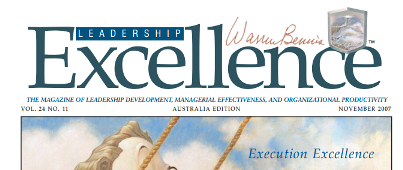Self promotion is an essential soft skill in today’s corporate world.

Martin’s a good manager. He inherited a large call centre with teams of borderline manic-depressives. Complaints were common, call dropout rates atrocious, morale was low. People clock-watched and turnover and absenteeism were high. Martin fixed it. He delivered improvements. Installed performance measures and instituted staff reward systems. Did what any good manager would do. And no one noticed.
Now perhaps his manager wasn’t a very astute business person. That’s
not the issue. Martin wasn’t appreciated, didn’t get applauded, and got
no opportunities to advance as a result of his hard work.
There’s an odd parallel in the fact that 71% of women on boards in the
UK have titles. Having a title in the UK is probably like being a sport
star in Australia – it gives you a profile and opens doors. So what do
people do when they can’t throw a ball and haven’t inherited a title to
achieve business success? Both Martin’s story and the board statistic
point to the need for our talents to be “publicised” as well as lived.
Download the free book-version of this article (plus more) Click here

Self-promotion is an essential skill
Countless surveys list presentation and influence skills as primary for senior managers. Recent research from the Australian Business Women’s Network cited self-promotion as the most essential skill. When I worked with Martin it became clear that, despite all his other skills, self-promotion was what he lacked.
This goes against a common belief that ability alone will get us

Make sure people know you and what you do
The first requirement is to have a high Availability rating. Availability is about people knowing you exist. It’s not about what you know, but who knows you know it. Managers with high Availability factors remember that it’s not enough to do a good job; people need to know you’ve done it – through published KPIs, through client testimonials, by the way your staff work.
Fit in and work with others
The second requirement is Affability. This is about rapport –

Remember ability isn’t enough
The third requirement is Ability. This is where most people put their
attention. They get stuck improving their Ability, and miss the other
two steps. They think doing a great job gets you noticed.
Sometimes it does. But if you make the network run, then you only get
noticed if you do a bad job and the network fails. Even at managerial
level, where the required skills are mainly soft skills, affability and
availability often get overlooked.
You may think I’m suggesting that self-promoting overrides your ability to deliver. Not at all. You should have good skills to be a good manager. I also know that many managers with excellent skills have to settle for less than they want or deserve. They do so because they miss the first two steps – either they don’t let people know what they’re doing well, or they don’t know how to fit in with the team.
Many people with ability do make it to the top. Jim Collins in Good to Great talks about the self-effacing leaders who bring organisations from good to great. They may not make it into the press, but their peers and their organisation know them. Their Availability rating isn’t global, but it is local.
Support yourself through self promotion
So, if you feel under-rated or under-recognised, and are wondering why, look at how you support your self-promotion.
You can gather a portfolio of your recent achievements, e-mails from happy clients, lists of projects brought in on time, comments from staff and managers.
Consider stopping to appreciate what you’ve achieved, rather than completing the day asking “What on earth did I do today?” Once you’ve collected this portfolio, you’re ready for the next step.

Self promotion is another soft skill you need
Beating the ability myth and promoting yourself and your abilities is not difficult, it’s just another soft skill. Observe the successful people in your organisation, the ones who seem to get what you want, and ask yourself what they are doing that you could do.
If you don’t blow your own trumpet, no one else will.
It is quasi-un-Australian to boast, brag or even display successes. So observe how others do it in a comfortable way, and follow their lead.

This article was originally published in Leadership Excellence.
I have since developed it into a book. You can download it without even signing up here.





